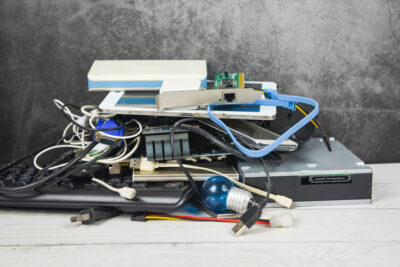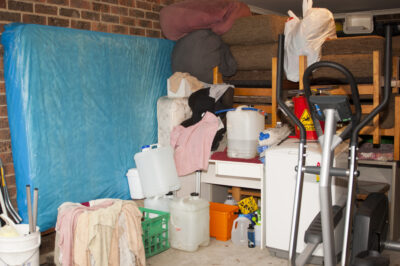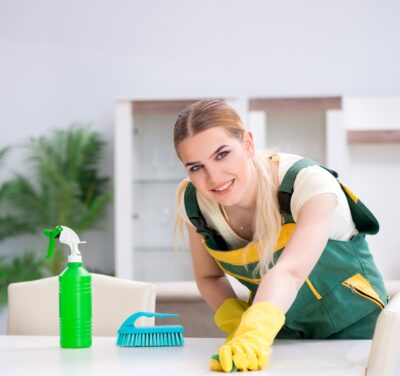Living green in Orlando is simplified by a complex and expeditious waste collection system. Most people can figure out how to use their garbage, recycling, and yard waste containers. However, they become a little confused when faced with hazardous waste, even at the household level.
Oddly enough, we have discovered many people just save it. And that is dangerous. Once you have made a commitment to a greener, cleaner, leaner way of life, you might notice the hazardous waste lurking insidiously in your own home.
The Consolidated Waste Systems Guide to Household Hazardous Waste

Living Green Begins With Disposing Of Hazardous Household Waste.
With this blog article, we begin a Consolidated Waste Systems Guide to treat our blog readers to some basic knowledge about living green in Orlando.
This down-to-earth, up-to-date blog article brings you the facts about your household hazardous waste and what to do with it.
You might find it very illuminating because you might have been mindlessly tossing some hazardous items right into the garbage can. Disposing of hazardous materials properly will make your home a safer place to live. Additionally, our over-stressed landfills will thank you for not adding to their problem.
Of course, this blog article will help you do your part to keep Orlando cleaner and greener. But more importantly, Consolidated Waste Systems hopes you will learn how to keep your home much safer. Hazardous Waste has earned its name; it is generally dangerous to human life.
Taking Scavenger Hunt for Living Green
You might task yourself with a little scavenger hunt before the fall season. Make it part of a summer clean-up. In the kitchen, we bet you have a junk drawer full of used-up, different-sized batteries, and cheap dead flashlights.
You know you should not throw them into the paper or recycling trash container. Besides, doing so would make you feel a twinge of guilt. However, since you do not know what to do with them, they just live there in that junk drawer, taking up valuable space.
Under the sink in the kitchen are a few old bottles of pesticide. (You know that stuff is poison and you killed out those spiders years ago in the great spider invasion of 2015. But, what should you do with it, now?)
Do Sinister Dangers Lurk in Your Garage and Block Living Green?
Likewise, when we open the garage door, we see a dazzling display of hazardous waste. There are several cans of old oil-based paint from restoring your dining room furniture.
Near those cans, some strange metallic bottles of mysterious plumbing stuff live. It’s marked “corrosive.” Leaning against the shelf are those old fluorescent light tubes. (Did you know they contain mercury?)
At this point, you might shiver a bit. However, we have not yet finished our search for hazardous household waste that is blocking your way to living green.
Check out Your Garden Shed For Seemingly Innocent Hazardous Waste
That harmless-looking half-bag of fertilizer and the tub of old pool chemicals qualify as first-class items of hazardous waste.
Reading Labels: Part of Living Green

It’s Not Just Junk. It is Classed as Hazardous Waste. Please Dispose With Care.
Also lurking in the shed, we find a couple of old computer towers and screens. There is also a broken television and 3 thermostats from an old heating system. You think of it as junk. But, these items are truly classified as hazardous waste.
In the first place, living green means being able to identify your hazardous household waste. How do you know? Reading the labels will give you clues if you do not know about some items.
Orlando city government identifies household hazardous waste as “any product that includes any of the following words on its label: Flammable, Poison, Warning, Corrosive, Explosive, Danger, Pesticide, Caustic or Acid.”
More Clues about Hazardous Waste in Orlando
Here’s a surprising fact. Many types of latex paint, as well as oil-based paint, are considered hazardous. Like the fluorescent lights and the thermostats, they condemn some pigments for containing mercury. Living green does not mean you never use these items, just that after use, you properly dispose of the “left-overs.”
Here is the Official List for Orlando and Orange County: Common Household Hazardous Products
Expand your scavenger hunt. This official Orange County list of hazardous waste will aid your hunt:
- Wet paint: Look for oil and water-based, aerosols, stains, and sprays.
- Pool chemicals: chlorine, acids are outstanding villains.
- Petroleum Products: Storing cans of extra gasoline, oil, and diesel fuel are the antithesis of living green.
- Rechargeable batteries are classified as hazardous waste, whether they are Ni-cad or Lithium.
- Cleaning products: It’s no surprise that furniture strippers, cleaners, and soaps can be hazardous.
- Pesticides: Do not keep old insect killers, rodent killers.
- Herbicides: Learn how to get rid of left-over weed killers as well as that ancient bottle of tree stump rotter.
- Fertilizers: liquid and granular fertilizers have no place in your home.
- Unknown or unlabeled products should be disposed of properly.
- LP Gas bottles.
- Prescription Drugs: Yes, there is a proper way to dispose of these in Orlando. Check out these Prescription Drugs Disposal Locations.
Living Green: Step One

Read the Label. If An Item is Marked Toxic, Poison, Corrosive, Or Poison, It is Hazardous Waste.
As this article attests, step one to living green is ridding yourself of household hazardous waste.
Suppose you want to ask questions of the experts? The Orange County Solid Waste Hotline gives you all the details on hazardous household Waste at their convenient number 407.836.6601.
Follow These Two Big Green Regulations for Hazardous Waste Disposal
We endorse the message of the Orange County Solid Waste Management facility.
- They state, “For your safety and the safety of our environment, please follow all product directions and avoid using these products in excessive amounts.”
- They also inform us that the collection of such hazardous waste at the curbside would be illegal. However, Hazardous Waste can be disposed of at the following facilities free of charge:
- Orange County Landfill (They even take LP Gas Bottles off your hands. ) 5901 Young Pine Road, Orlando, FL 32829
Hours of Operation: Monday – Sunday. 8 a.m. to 5 p.m.
Phone: 407.836.6601
- Porter Road Transfer Station
1326 Good Homes Road, Orlando, FL 32818
Hours of Operation: Wednesday – Saturday. 8 a.m. to 5 p.m.Phone: Phone: 407.836.6601
A Few More First Steps in Living Green
Living green is also the goal of the experts at the Minnesota Pollution Control, far away from Orlando, but close to us in green sentiment.
They recently stated, “Reducing toxins inside your house can be as simple as looking for a few keywords on products when you buy cleaning products.” They add, “Choose the least hazardous product to do the job.”
Likewise, we agree you should read directions on hazardous products and use as little as possible of them.
Alternatively, find and choose green products, such as plant-based cleaning products. Green Manufacturers are creating them with “materials, such as oils made from citrus, seed, vegetable or pine.”
Living Green With a Little Help from the EPA
The U.S. EPA’s Design for the Environment program creates a label (DfE) that helps you find products that are safer for the environment than some of those hazardous ones. When you intentionally search for the DfE label, you are well on your way to living green.
You can also look for the products with the “Safer Choice” label. This certifies that the ingredients in the products are not only safer for you but also for the environment. The E.P.A. Safer Choice is awarded as a prized recognition. Did you know more and more businesses are competing in the field of green choices?
“Safer Choice helps consumers, businesses, and purchasers find products that perform and contain ingredients that are safer for human health and the environment.”
By the way, if you are a manufacturing business, and your products are clean and green, you might want to compete for this recommendation from the EPA. We are sure we could help you by offering you the business options for your cleanest and greenest waste systems.
Terrific Take-Aways from Living Green

Be Aware. You Have Options For Caustic Cleaning Supplies. You No Longer Have to Use Toxic Chemicals.
Meanwhile, here at Consolidated Waste Systems, we hope we have brought you news you can use in this blog. We appreciate our readers. As always, we remain committed to bringing readers both business and household information for living green and managing waste in Orlando, Florida, the US, the world, and perhaps, the galaxy.


